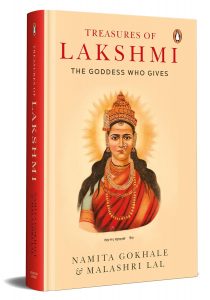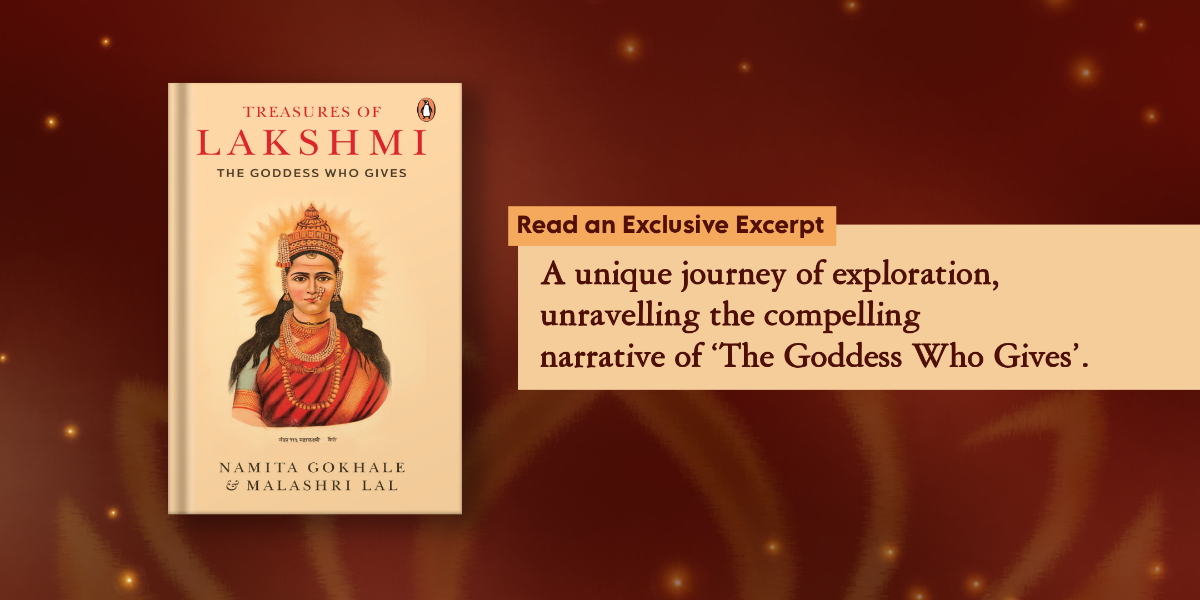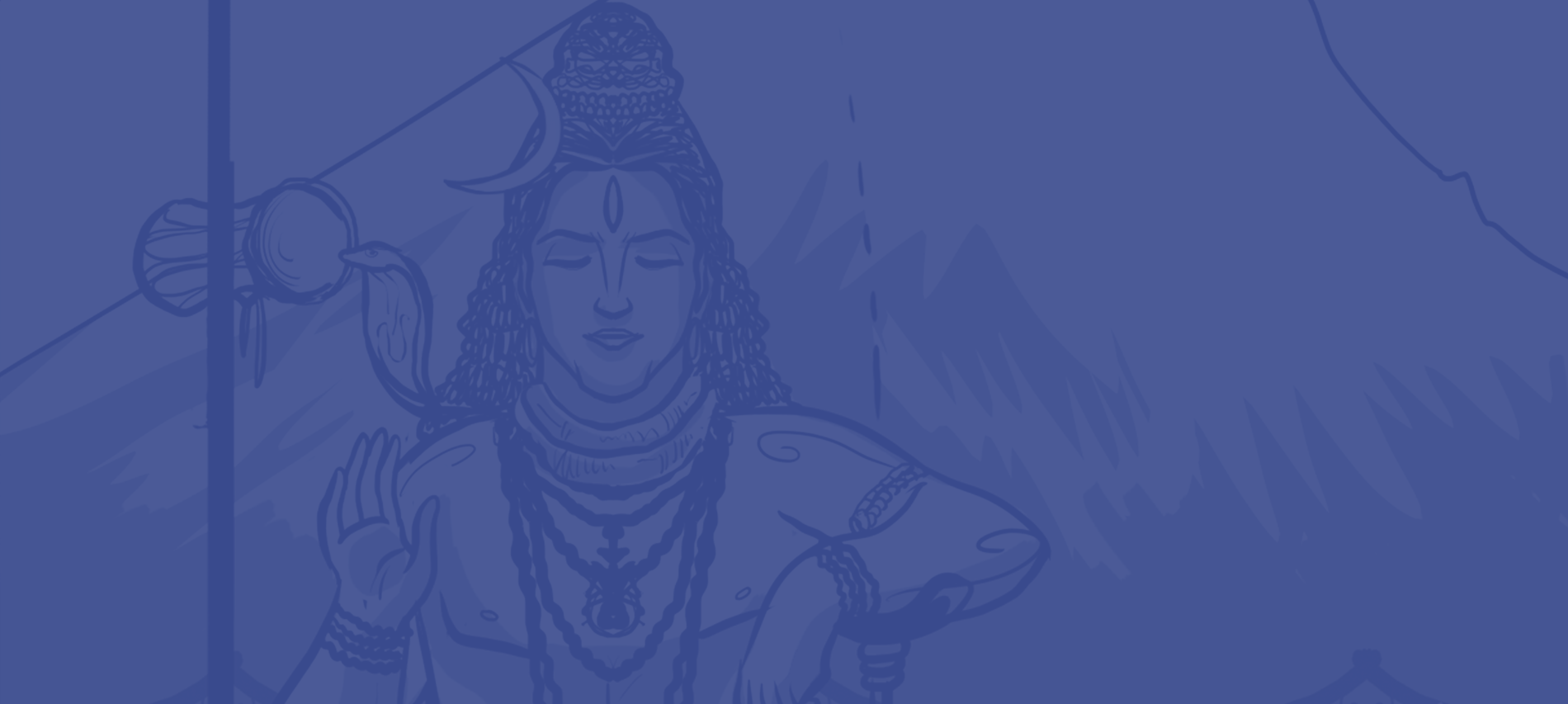Explore Hindu mythology like never before with Namita Gokhale’s Treasures of Lakshmi. In this book, Gokhale unfolds the stories of ancient deities, exploring their evolution from the Rig Vedic era to the post-Buddha period. Against the historical backdrop of events like Alexander’s arrival in India, the book delves into the tales of gods and goddesses, with a special focus on Lakshmi’s story of prosperity from the Vishnu Purana.

***
THERE ARE MANY gods and goddesses in the Sanatan Dharma (Hinduism is a newer word, proposed as recently as the nineteenth century). Aldous Huxley translated it as ‘the perennial philosophy’. In the Rig Veda, the gods which feature in the hymns are Indra, Agni, Varuna and Surya, who become minor gods by the time of post-Buddha India. It is said that when Alexander arrived in the Indian subcontinent in the fourth century bce, there was worship of a god similar to Heracles, who has been later identified as Krishna.
The Vishnu Purana is dated by its most recent translator, Professor Bibek Debroy, as being from the period 450 bce to 300 bce, definitely a post-Buddha document. You see immediately that the Vishnu Purana is post-Vedic and even post-Vedantic. Vishnu replaces the abstract universal principle of Brahman: ‘He is the supreme Brahman.’ The irresistible conjecture is that faced with the concrete persona of Buddha and the rapid spread of Buddhism, the Sanatan Dharmists retaliated with a personal but immensely powerful god: Vishnu.
So, sometime in the second half of the last millennium bce, there is a shift to the modern Trimurti structure with Brahma, Vishnu and Mahesh. The old Rig Vedic gods are demoted and a new set emerges which takes over. The Vishnu Purana has stories about all three deities but constantly reiterates the supreme position of Vishnu.
Then, Brahma somehow gets displaced. (We need not go into this episode.) There are few, if any, temples dedicated to him, relative to the other two male gods. Somewhere, then, the mother goddess, Durga/Kali/Amba, becomes as important in the Trinity as Vishnu and Shiva. There is some discussion of Durga being a pre-Aryan goddess, but this may be controverted. Saraswati is the only other goddess worshipped in her own right and not as the consort of a male god.
The point is that while the pantheon of deities is crowded, there are only three at the top—two male gods and one female goddess. (Of course, attributing gender to gods and goddesses is tricky. Shiva doubles up as Ardhanareeshwar.) Lakshmi, the subject of this essay, is not in the top Trinity. She appears as the consort of Vishnu and is worshipped especially on the thirteenth night of the waning moon cycle, two nights before Diwali. The occasion is called Dhanteras in Gujarati, being the one night dedicated to the goddess of prosperity. No other goddess has a Diwali slot.
But as Shri, Lakshmi is ubiquitous. We append the labels ‘Shri’, ‘Shriman’, ‘Shrimati’, indicating someone favoured or due to be favoured by the goddess Lakshmi. Widows (in Gujarati at least) are addressed as ‘Gangaswaroop’, definitely not Shrimati. Fortune for a woman resides in having a husband around.
It is in the Vishnu Purana—a massive document running to almost 600 pages in Bibek Debroy’s book—that we encounter Lakshmi’s story. Purana storytelling is, of course, not straightforward or linear. It wanders, often telling the same story more than once with different nuances. You are supposed to listen and retain the details.
Lakshmi is first mentioned along with the story of Sati (Parvati) in Chapter 1 (8) titled ‘Rudra’s Account’. In the Vishnu Purana, Parashara is talking to Maitreya and telling him the long story of Vishnu. Rudra occurs in the Rig Veda and is called Shiva later on. Rudra marries Sati. But then Daksha’s anger comes in the way and Sati gives up her body. However, she is born again as the daughter of Himavat and Mena as Uma. ‘In this form, the illustrious Hara married her again.’
The first casual mention of Lakshmi follows. ‘Bhrigu’s wife Khyati gave birth to the divinities, Dhatri and Vidhatri, and to Shri, the wife of Narayana, the god of the gods.’ Maitreya asks how that can be, since Lakshmi emerged from the churning of the ocean. So, in a way, Lakshmi’s story is presumed to be known, but of course given the style of a Purana it has to be told again. Parashara launches into a laudatory description of Shri, but more so of Vishnu, whose female companion Shri is. Vishnu is praised to the utmost, while Lakshmi has glory as Vishnu’s other.
Chapter 1 (9) is devoted to the story of the emergence of Lakshmi from the churning of the ocean, Samudramanthan.It is a fascinating account as to how Shri emerges from the ocean churning process. The story starts in somewhat dramatic fashion with the sage Durvasa ‘observing the vow of acting like a lunatic’. He has a divine garland made of santanaka flowers, which grow in Indra’s gardens. The sage throws the garland at Indra, who is riding the Airavata. Indra puts it on the Airavata, who throws it off. Durvasa is enraged by this disrespect and curses Indra and the gods that they will lose their prosperity. He says, ‘All mobile and immobile entities dread the arousal of Lakshmi’s wrath. But because you take yourself to be the king of the gods, in your pride, you have slighted her and me.’ In this way, the story of Lakshmi is laid out. (Though she is first mentioned in ‘Rudra’s Account’, that is a passing reference in which Lakshmi is included along with other characters.)
***
Get your copy of Treasures of Lakshmi by Namita Gokhale wherever books are sold.









